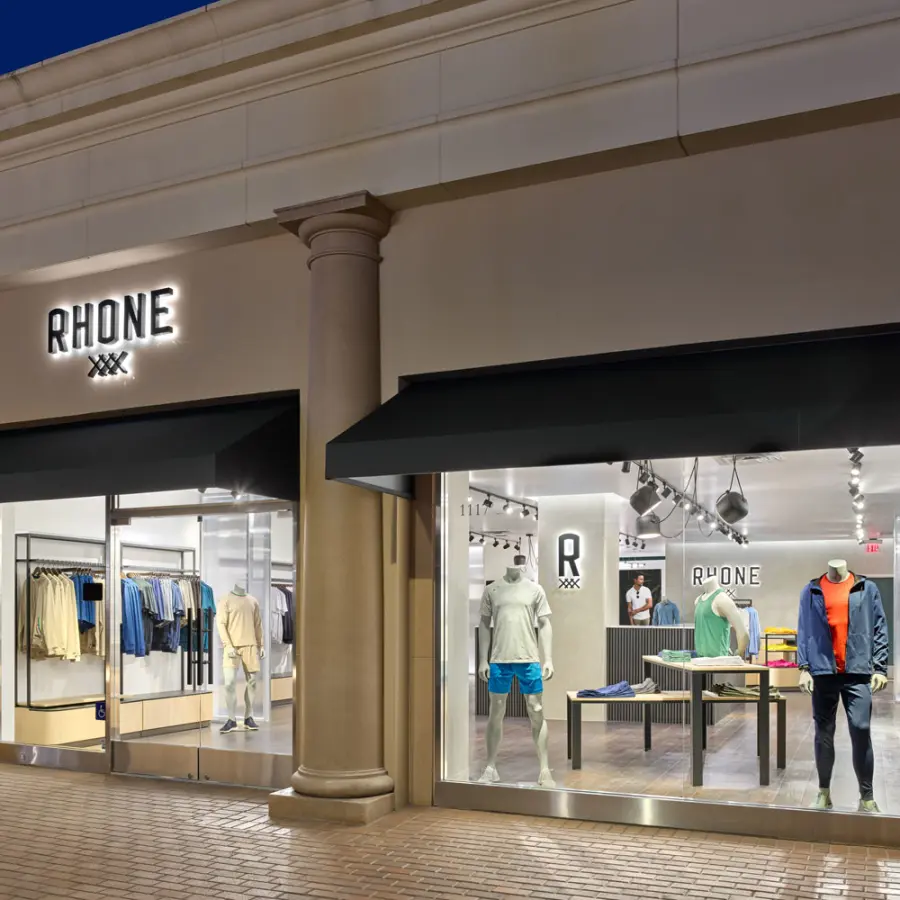Rhone Plots Activewear Expansion as L Catterton Sells Stake

As it eyes a retail and womenswear expansion, Rhone also has received investment from NBA team owners and former NFL stars
The founders of Rhone, a fast-growing premium activewear brand, have pulled off a major power move, buying back private equity firm L Catterton’s stake and seizing the reins of their budding activewear empire — with the backing of former pro athletes and NBA owners.
The Connecticut-based brand has now ramped up store openings, anticipating to have 15 open by the end of the year, according to a report by Bloomberg. Although Nate Checketts and his brother Ben founded Rhone as a men’s activewear brand in 2014, the company will debut a women’s collection in 2024.
Unlike Ten Thousand, another men’s activewear brand, Rhone’s push into women’s activewear is a direct response to women serving as an existing consumer audience, with a reported 30% of revenue coming from women purchasing Rhone merchandise as gifts.
The lucrative play has mostly been kept under wraps — until now. The transaction closed in July 2022, but according to Bloomberg, Nate held off on publicly discussing the deal until he confirmed it had been the right move.
Before Rhone expanded its footprint with stores in four states, a retail presence in Equinox locations, Nordstrom, CorePower Yoga, Peloton Studios and over 350 gyms, it originally launched as an ecommerce site.
After completing a seed round in 2015, Rhone needed additional funds to continue growing and, by 2017, had landed a major investor with private equity firm L Catterton. The investment was a game-changer for Rhone, but it came with a price that weighed heavily on its founders.
“I realized the moment we sell this business or bring in a majority partner, I’m giving away my control in terms of how I get to guide and direct this brand,” Nate told Entrepreneur. “I was at a decision point. I needed to sell and leave, or I needed to double down.”

The Checketts began to realize their desire to grow Rhone without the end goal of an IPO or acquisition but knew they’d have to buy out L Catterton first.
After receiving expert advice, the Checketts came up with a strategy to create a special purpose vehicle, which enables multiple investors to pool capital and invest in a single company. They then set out to find notable investors comfortable with gains in the long term versus the short term. It wasn’t a difficult task — a long list already existed of those who, at one point or another, expressed that they’d love to invest in the activewear brand — and it was a list that Nate had saved.
At one point, Gap even tried to woo the activewear brand with the hopes of combining Rhone with its activewear brand Athleta, but the deal never evolved.

Sports Owners, Stars Come On Board
Investing in Rhone also resonated with Gabe Plotkin, Charlotte Hornets co-owner, Blackstone Inc.’s David Blitzer, who is also co-owner of Philadelphia 76ers and New Jersey Devils, and former NFL players such as Tim Tebow, Steve Young, Troy Aikman and Justin Tuck.
While L Catterton initially wanted to remain investors, they eventually became receptive to a sale, especially as valuations began to soften.
“I told them: ‘Not for nothing, this is what I want,'” Nate told Bloomberg. “At that point, they were thoughtful and said: ‘If we can get to a number that makes sense, we’ll figure out a path.'”
Although terms of the deal haven’t been disclosed, L Catterton agreed to buy back shares in a transaction that went so swimmingly that Jon Owsley, a managing partner of L Catterton, has remained on Rhone’s board.
As the activewear brand looks ahead, the enthusiasm for Rhone and its future is apparent.
“We’re not focused on the short or mid-term of going public, but what we are really focused on is building a great long-term business,” Nate told Yahoo Finance. “So internally, we talk about developing public-ready protocols because we believe it’s important to compare ourselves to really well-run public companies, but it’s not on the short or mid-term horizon to go public. We just want to build great products for our customers.”
Courtney Rehfeldt has worked in the broadcasting media industry since 2007 and has freelanced since 2012. Her work has been featured in Age of Awareness, Times Beacon Record, The New York Times, and she has an upcoming piece in Slate. She studied yoga & meditation under Beryl Bender Birch at The Hard & The Soft Yoga Institute. She enjoys hiking, being outdoors, and is an avid reader. Courtney has a BA in Media & Communications studies.



